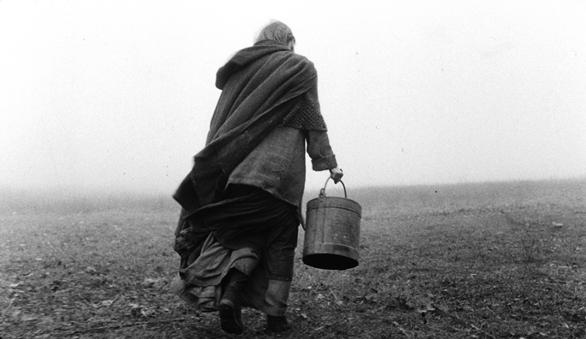Bela Tarr’s “The Turin Horse” is one of the bleakest, loneliest and most depressing films I’ve ever seen. But as is true of the Hungarian master’s other films, notably 2000’s “Werckmeister Harmonies,” it is a spellbinding endeavor.
Perhaps unlike “Werckmeister,” I find it more challenging to recommend embracing “The Turin Horse’s” even heavier burden. It is a film of modest proportions, characters, settings and presentation, but by the end of its 146-minute runtime the weight of the world will be on your shoulders.
The story consists of a man and his daughter struggling to survive on a farm during a violent gale with a horse that will not eat. Over the six days we meet these people, they will do nothing and say little and yet do all they must for survival.
The repetition in their lives is grueling. As the man Ohlsdorfer (Janos Derzsi) returns home, he laboriously feeds the horse and closes the shed, then trundles inside to the foot of his bed, awaiting his daughter (Erika Bok) to undress him. His face is worn, cracked and resilient, his eye is battered, his left arm is paralyzed, his gazes upon his daughter are disdainful and diminishing, and his grunts make him out to be as stubborn and useless as their horse.
Yet the girl is the pathos filled figure. She does so much on this farm, but she is hardly an authority here. Her work getting water from the well is thankless and done without acknowledgment and recognition. Her father is wasteful in the repulsive way he gnaws at baked potatoes with one hand, and she is so lifeless and lost as she sits at the dinner table. She slowly reads the Bible aloud, but even that seems hopeless. How she can bare it all is an impossibly painful thought.
Worst of all, the pair each sits gazing out the window to pass the time. Their lives are as lonely and empty as can be.
And each day, Tarr shows us their pointless routine from a new awful angle. After first seeing how sickening it is to watch the man eat his potato, Tarr turns the knife again by showing us his blank faced daughter just across from him the next day.
Those familiar with Tarr can instantly pinpoint his black and white cinematography and lengthy edits. “The Turin Horse” has only 30 shots throughout its duration, and rightfully so when we imagine how dull and dreary each passing moment must feel for these characters.
But the cinematography by Fred Keleman is impossibly complex. Tarr evokes a devastatingly windy storm, and yet Keleman’s camera is light and mobile, leaping from the back of a cart in an early scene to wait patiently inside the stable as the pathetic horse watches their routine. And in the film’s magnificent first shot, we are positioned under the immense beast only to seamlessly float alongside the steep and treacherous side of the road. The way in which he captures every angle of the room without ever seeming to give us any actual spatial closure helps to make Tarr’s powerful metaphor.
As we stare down the deeply expressive face of the horse, we realize that its inability to eat or work is a statement of indifference to life and this meaningless existence. The film’s six days seem anti-Biblical in the destruction of light and life around them, and in the process seeks deeper into despair as we see these people increasingly incapable of doing anything that would improve their lives.
They turn away a rambunctious flock of gypsies, they lose the ability to work when a well dries up, and when they attempt to pack up and leave to somewhere with more resources, they can’t even bring themselves to completely go because they know there is nothing out there for them.
The ending is maddening in the way Tarr is capable of draining more and more from us. To see it finally end in a horrifically photographic silhouette is something of a relief, but its unreal lack of any life at all is magnificent.
4 stars

1 thought on “The Turin Horse”